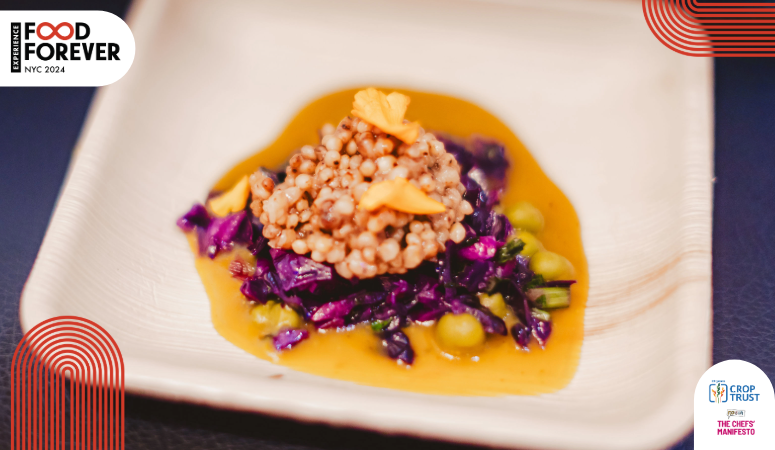Caribbean Pigeon Pea Stew with Sorghum

13 December 2024
Pigeon peas, a staple in Caribbean cuisine, have a rich history and are deeply loved for their earthy flavor and versatility. This hearty stew is a classic comfort food, often served with rice or, in this case, sorghum. The combination of the creamy pigeon peas, savory spices and the nutty texture of sorghum creates a truly satisfying and flavorful meal.
Ingredients
450 g fresh pigeon peas (or 4 cups canned)
1.18 liters vegetable stock (or 5 cups)
30 g small vegetarian pepper (optional)
3 g parsley or thyme sprigs
28 g vegetable oil (2 tablespoons)
70 g red onion (about 1 small onion)
0.25 g dried oregano (1/4 teaspoon)
2 cloves garlic
300 g diced Kabocha or Calabaza squash (2 cups)
5 g salt (1 teaspoon)
Method
In a pot heat the oil over medium-low heat. Add onion, cook, and stir until it becomes translucent.
Add the pigeon peas. Cook stirring until they are heated through. Change heat to low.
Follow the next step only If you are cooking with fresh pigeon peas. Skip the next step if you are using boiled-from-dry or canned pigeon peas.
Cover and let it cook over low heat, stirring often until the pigeon peas are soft when you pinch them (about 35 minutes if freshly shelled, five to ten minutes if boiled or canned).
Add the vegetable stock.
Add the squash and boil over medium heat until it is cooked through and the peas reach a creamy consistency, adding more water as it becomes necessary to maintain the same level. Stir often to prevent it from sticking to the bottom of the pot.
Remove the onion pieces and thyme (if you used fresh sprigs).
Season with salt to taste and simmer for another two minutes.
Remove from the heat stir in the parsley and serve over cooked sorghum.
Number of servings: 6-8
Fun fact: Pigeonpea is a drought-resistant crop that thrives with minimal inputs, making it crucial for small-scale farmers in semi-arid regions. Rich in vitamin B and protein, it’s a staple in subsistence diets, particularly in South Asia, where dried pigeonpea is used in dhal. Beyond food, pigeonpea serves as livestock feed, living fences, and material for fuel and construction.
The Crop Trust supports the conservation and use of pigeonpea through projects like Seeds for Resilience, which helps national genebanks in Kenya and other African countries safeguard their collections. In Kenya, the Crop Trust collaborates with the Genetic Resources Research Institute (GeRRI) to conserve and promote pigeonpea. The Crop Trust also provides long-term funding to ICRISAT, which conserves and researches pigeonpea and other highly nutritious drought-tolerant crops like chickpea, pearl millet and sorghum.
